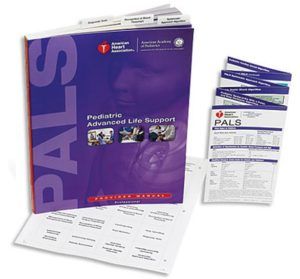Healthcare Providers
Pediatric Advanced Life Support
*Once you purchase the course, you will be redirected to schedule the class.

Pediatric Advanced Life Support (PALS) Initial Course
Due to COVID-19 all in person classes will have class size restrictions.
The American Heart Association Pediatric Advanced Life Support (PALS) course is based on science evidence from the most current AHA Guidelines for CPR and ECC. The goal of the PALS certification course is to aid the pediatric healthcare provider in developing the knowledge and skills necessary to efficiently and effectively manage critically ill infants and children, resulting in improved outcomes.
This course runs from 9am – 5pm for 2-Days.
$275 per person

Pediatric Advanced Life Support (PALS) Renewal Course
Due to COVID-19 all in person classes will have class size restrictions.
This official American Heart Association PALS renewal course is a 1-day 9am – 5pm in-person class that is designed for people who have already taken PALS, and have a current PALS card, or expired card within the past 30 days.
$220 per person

Pediatric Advanced Life Support (PALS) Online Course
We are currently still offering this course to those who need it for work purposes.
Updated to reflect science in the 2010 AHA Guidelines for CPR and ECC, HeartCode® PALS Part 1 is a web-based, self-directed program that teaches healthcare providers knowledge and skills needed to recognize and prevent cardiopulmonary arrest in infants and children. Using eSimulation technology, students assess and treat patients in virtual healthcare settings where they can apply their knowledge to real-time decision-making and skills development.
After completion of the online portion, the student will be required to schedule an in-person skills examination to receive their card
$275 per person
PALS Key is NON-REFUNDABLE